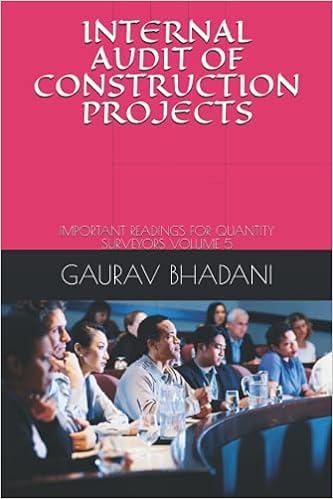Question
A parent company acquired 70% of the stock of a subsidiary company on January 1, Year 1, for $180,000. The subsidiary company does not qualify
A parent company acquired 70% of the stock of a subsidiary company on January 1, Year 1, for $180,000. The subsidiary company does not qualify as a VIE, and the parent company is determined to have control. On this date, the balances of the subsidiarys stockholders equity accounts were Common Stock, $100,000, and Retained Earnings, $40,000. On January 1, Year 1, the market value for the 30% of shares not purchased by the parent was $60,000.
On January 1, Year 1, the subsidiarys recorded book values were equal to fair values for all items except three: 1. Accounts Receivable had a book value of $30,000 and a fair value of $23,000 2. Buildings and Equipment, net had a book value of $50,000 and a fair value of $62,000 3. Licenses intangible asset had a book value of $35,000 and a fair value of $70,000
Both companies use the FIFO inventory method and turnover their inventories at least once per year. The net balance of accounts receivable is collected in the following year. On the acquisition date, the subsidiarys buildings and equipment, net had a remaining useful life of 4 years and the licenses had a remaining useful life of 7 years.
On December 31, Year 4 the Subsidiary Company issued $500,000 face value bonds to an unaffiliated company for $480,000. The bonds pay interest annual on December 31, and the bond discount is amortized using the straight- line method. The bond amortization schedule from the initial issuance date is provided in the excel doc.
The parent accounts for its Equity Investment in the subsidiary using the equity method. Unconfirmed profits are allocated pro-rata.
In Year 5:
-
The subsidiary reported net income of $14,300, and declared dividends of $10,000.
-
During Year 5, the Subsidiary company sold Inventory to the Parent company with a profit margin of 25 percent of selling price. The intercompany sales amounted to $20,000, of which $3,000 of merchandise remained in the ending inventory of the parent at 12/31/Y5.
-
The Parent sold land to the Subsidiary on 7/1/Year 5 for $25,000. The land was originally purchased by the parent for $20,000.
1. Prepare the Consolidation entries for Year 5.
In Year 6:
-
On January 1, Year 6, the Parent company acquires an additional 10% ownership in the Subsidiary for $32,000
-
2.Prepare the journal entry to record this transaction on the Parents books.
-
On December 31, Year 6 the Parent paid $509,000 to purchase all of the outstanding Subsidiary bonds (issued in Year 4, as noted above.) The bond premium is amortized using the straight line method. The bond amortization schedule for the Parents bond investment is provided in the excel doc.
-
The Subsidiary reported net income of $60,000 and declared dividends of $18,000.
3. Prepare the Consolidation entries for Year 6.
Step by Step Solution
There are 3 Steps involved in it
Step: 1

Get Instant Access to Expert-Tailored Solutions
See step-by-step solutions with expert insights and AI powered tools for academic success
Step: 2

Step: 3

Ace Your Homework with AI
Get the answers you need in no time with our AI-driven, step-by-step assistance
Get Started


